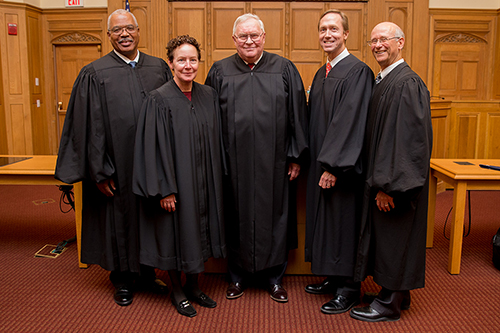This website uses cookies
We use cookies to ensure that we give you the best experience on our website. If you continue to use this site we will assume that you are happy with it.

Chief John E. Sparks, Jr., Judge Margaret A. Ryan, Chief Judge Scott W. Stucky, Judge Kevin A. Ohlson, & Senior Judge Andrew S. Effron.
On November 8, the United States Court of Appeals for the Armed Forces held a hearing at Cornell Law School for the first time. The Court heard an argument in the MacDonald Moot Court Room in a case involving a U.S. Air Force captain who alleges that a military agent exceeded the scope of a warrant during a search of his office. During their daylong visit, the court’s judges met with students and faculty, and two judges guest-taught in a constitutional law class.
The case before the court was an appeal filed by Captain Tyler G. Eppes, who pleaded guilty in 2015 to conspiracy, making false official statements, larceny, fraud, and conduct unbecoming an officer. A military judge sentenced Eppes to ten years of confinement, ordered him to pay $64,000 in fines, and dismissed him from the Air Force.
At the trial level, the government alleged that Eppes had spent six months planning his own wedding, fraudulently claiming that it was an official government function. During that time, Eppes submitted travel vouchers to the government for expenses related to the wedding and used a government computer to plan the event, according to the prosecution.
While investigating the case, the Air Force Office of Special Investigations requested authority to search Eppes’ person, personal bags, and vehicle. In February 2013, a military magistrate issued a warrant to search Eppes’ person and vehicle, but not his personal bags. But during the investigation, military agents did search his personal bags, which contained various documents they identified as evidence of travel and insurance fraud.
Although Eppes entered a guilty plea, he reserved the right to appeal the issue of whether the search exceeded the magistrate’s authorization, and whether his right to freedom from unreasonable search and seizure under the Fourth Amendment was violated. While the Air Force Court of Criminal Appeals denied his appeal in February 2017, the U.S. Court of Appeals for the Armed Forces granted his petition to review the issues in the case.
At the November 8 argument, in addition to arguments by attorneys representing Eppes and the government, Cornell Law student Seantyel Hardy ’18 argued as a friend of the court. She and another law student student, Angelica Nguyen ’18, had drafted an amicus brief under the supervision of Professor John Blume, the Samuel F. Leibowitz Professor of Trial Techniques at the Law School.
Hardy argued that the search of Eppes’ personal bags in his office violated the Fourth Amendment and that no exception to the exclusionary rule applied to the evidence seized. She said the search exceeded the scope of the warrant, which specifically authorized a search of only his person and his car.
“This exceeds the scope of the warrant in a materially broad way, given that they first tried to get authorization to search the bags and failed to get authorization, and then they conducted the search in a way that they wanted to conduct the search, rather than conducing the search they were authorized to conduct,” Hardy told the court.
Chief Judge Scott W. Stucky asked Hardy whether there was any information in the record indicating how close the bag was to the agent’s reach, and Hardy said there was only a reference to the space being “closet sized.” Stucky then asked, “Assume for a moment, that the bag was not attached to him, sitting on the floor, or sitting on his desk, but that he could stick out his hand and touch it. If this were a search incident to arrest, would the bag have been searched, for a weapon?”
Hardy said that if it was a search incident to arrest, anything within the agent’s immediate vicinity would be able to be searched. “However, the immediate vicinity analysis is improper here and is mistaken, because given that this was not a search incident to arrest, that language and the search of his person does not expand to his immediate vicinity,” Hardy said.
The court issues decisions in cases about one hundred days after oral arguments are heard.